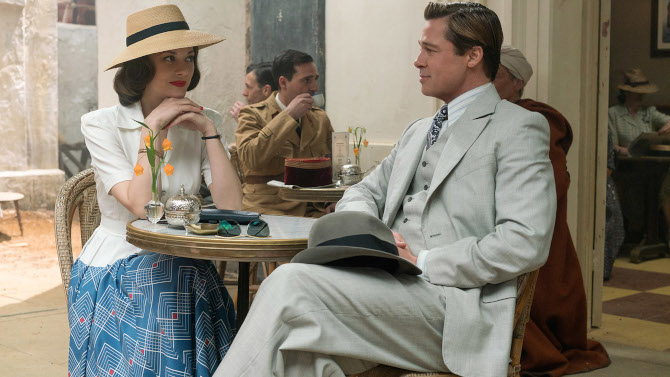
Déjà vu Dalliance
Channeling the mesmeric movies churned out by the studio system back in the 1930s and 40s, Allied (2016), directed by Robert Zemeckis, channels the likes of Morocco, Casablanca, Across the Pacific, Gilda, To Have and Have Not, and numerous others – attempting to find a spark from the classic themes of melodrama, romance, suspense and the epic nature of the annals of the cinematic past, with quite successful results. Set the year Casablanca and Across the Pacific were released – 1942, the story in fact starts in Morocco, with recently parachuted in Canadian spy Max Vatan (Brad Pitt) meeting up with another undercover agent, Marianne Beauséjour (Marion Cotillard), who will be pretending to be his wife.
-
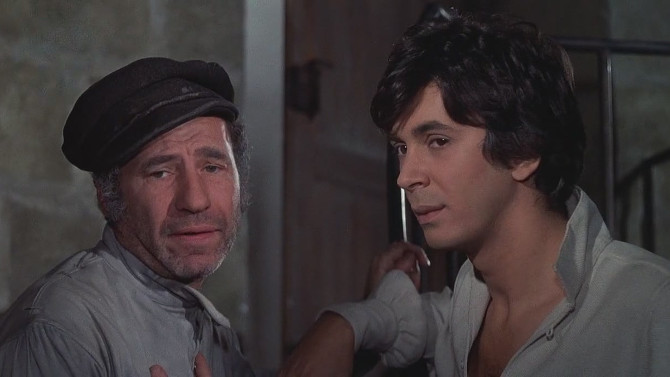
Hope For the Best, Expect the Worst
The Twelve ChairsJune 9, 2019A slick con artist, an unscrupulous priest and a ruined aristocrat walk into a house. . . sounds like a joke; it kind of is – for this is the lead-in to Mel Brooks’ 1970 comedy The Twelve Chairs. Loosely based on the 1928 Russian novel of the same name (written by Ilf and Petrov), this film is arguably the black sheep of Brooks’ filmography, a more artsy piece that is less laugh out loud funny, and instead, more of a thinking man’s funny – for instance, as a character wanders the Soviet streets at the beginning of the film (set in 1927), he passes two different street signs, the original: “Czar Nicholas II Avenue”; the new one, “Marx, Engels, Lenin & Trotsky Street – with a line running through the final name” – if you know your history, Nicholas and his family were executed during the Russian Revolution of 1917, while the name Trotsky has been eliminated, as in the very year this story is set, Joseph Stalin ran him out of the country and into exile – in 1940, Stalin would have him killed in Mexico City by way of an ice axe (I almost had a really good ice pun for this, but it slipped my mind). . . fear not, Brooks works some cheesy humour into the story as well.
-
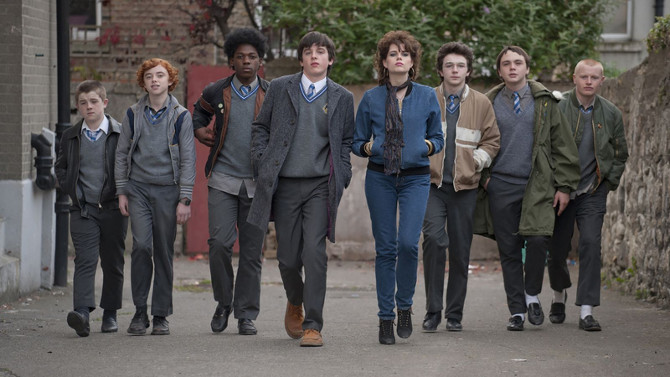
The Road Less Travelled
Sing StreetMay 28, 2019Learn an instrument, form a band, get the girl. . . the fantastical dream steps of many a wannabe rock star, yet the main character in John Carney’s 2016 musical dramedy Sing Street takes a slightly different route – ah, the road, or should I say street, less travelled (which, of course, is the oft misused false-title of Robert Frost’s “The Road Not Taken”). Welcome to 1985 Dublin, country floundering, jobs nonexistent, an existential crisis smothering the Populus. . . a place where teenager Conor is trudging through the early part of his life (his only saving grace, music). His parents, struggling architect Robert (Aidan Gillen – Game of Thrones) and ‘cut back to three days of work a week’ Penny (Maria Doyle Kennedy – Orphan Black), are constantly bickering – eldest sibling Brendan (Jack Reynor), a dope smoking college dropout who is an inspiration to Conor, even surmises that their mom may be having an affair. Youngest Ann (Kelly Thornton) must also be mentioned, for she is the sister who is often criticized for leaving her art dreams behind to pursue architecture (like her father).
-
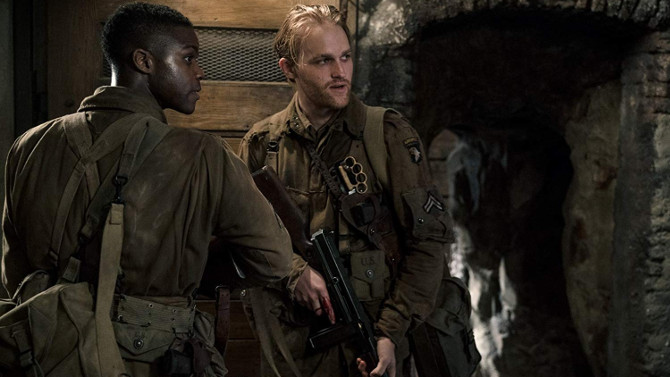
Overlord Overload
OverlordMarch 30, 2019A ‘B’ movie with loftier aspirations, 2018's Overlord, written by Billy Ray, directed by Julius Avery, and produced by J.J. Abrams’ Bad Robot Productions, is one of those rare movies that flips the script halfway through. . . but more on that later. On the eve of the D-Day invasion (during World War 2), a paratrooper squad has been given the gargantuan task of parachuting into a small town in France. . . their mission: to destroy a radio tower attached to an historic church – thus allowing the Allies to gain an upper hand during the paramount, multi-country attack the next day.
-
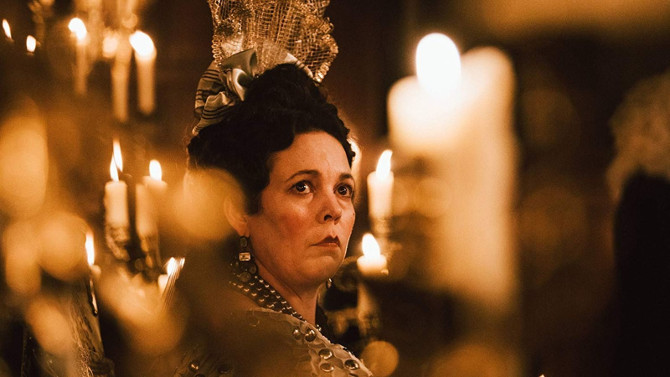
Queen’s Reich
The FavouriteFebruary 12, 2019An out-there European director, Yorgos Lanthimos has made waves with controversial pictures like Dogtooth, The Lobster, and The Killing of a Sacred Deer – intriguing, confounding, frustrating, and mesmerizing audiences worldwide. Now, he has made his first foray into a more mainstream style of film making with the 2018 period piece The Favourite (the first picture he and longtime co-scribe Efthymis Filippou did not write – in this case, an excellent story by Deborah Davis and Tony McNamara) – though, one thing is for sure, you cannot take the eccentric out of the Greek filmmaker. Nominated for ten Academy Awards (including Best Picture, Best Achievement in Directing, and a slew of others), the first thing immediately noticeable is the feature’s striking visual style. Intricately measured and visually opulent (most of it is shot in Hatfield House, Hertfordshire, England), it is often symmetrically framed, a very formal seriousness to the playful story. Like the structured beauty of a perfectly danced waltz, everything is in its place, the camera moving with its characters always in their position, Lanthimos often utilizing a quick 180 degree pan pirouette to provide the viewer with a quick shot of the opposing perspective. Speed is also tinkered with, slow motion and a quicker frame rate adding to the film’s mesmerizing quality. Also worth noting, every once in a while there is a fascinating use of a sort of fish-eye lens-style shot – providing a distorted, arced look to this lavish, gilded world. Hand in hand with this is the exquisite cinematography, director of photography Robbie Ryan shooting almost the whole picture with available natural light (the sun, candles, fireplaces and torches providing an eerie, romantic, and realistic vibe, adding to Lanthimos’ trance-inducing visual style).
-
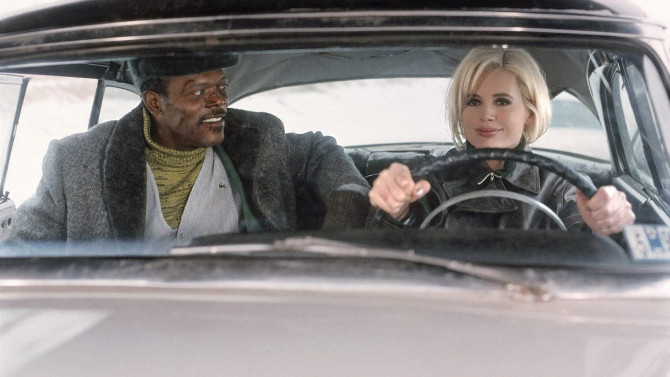
Thanks For the Memories
The Long Kiss GoodnightJanuary 22, 2019Yearning for some 90s action? Are you missing the era of over the top, easy to watch explosive entertainment? Well, you cannot get more 90s than The Long Kiss Goodnight (1996), written by Shane Black (the scribe behind the Lethal Weapon franchise, and, more recently, The Nice Guys) and directed by Renny Harlin (of Die Hard 2 and Cliffhanger fame). Following a cryptic enigma in the form of Geena Davis (Harlin’s then wife), the actress plays Sam Caine (work the anagram out), an amnesiac of eight years. . . a teacher with a cute daughter, Caitlin (Yvonne Zima), and loving husband, Hal (Tom Amandes). Completely unaware of her past, the woman washed ashore two months pregnant. . . everything before this, a puzzling mystery.
-

I’m On the Highway to Hell
I Will Crush You and Go to HellJanuary 13, 2019“You have brains in your head. You have feet in your shoes. You can steer yourself any direction you choose.” – Oh, the Places You’ll Go! By Dr. Seuss. A classic tale from the one and only, a positive story often gifted to those who are on their way after graduating. . . but, what happens if you take the wrong path, or as the master word twister so cheekily put it, “You can get so confused that you’ll start in a race down long wiggled roads at a break-neck pace and grind on for miles cross weirdish wild space, head, I fear, toward a most useless place. . .”, or, as the title of today’s short film puts it, I Will Crush You and Go to Hell (2016). Co-written and directed by the team of Fabio Soares and Célia Paysan, the twenty-two minute short is actually, in essence, a back door pilot used as a teaser in order to make a feature length film (full warning, no ending as of yet).
